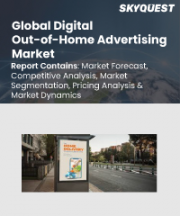
|
시장보고서
상품코드
1558330
DOOH(Digital Out-of-Home) 시장 예측(-2030년) : 유형별, 기술별, 용도별, 최종사용자별, 지역별 세계 분석Digital Out-of-Home Market Forecasts to 2030 - Global Analysis By Type (Billboards, Carbon Transit, Street Furniture and Other Types), Technology, Application, End User and By Geography |
||||||
Stratistics MRC에 따르면, 세계 DOOH(Digital Out-of-Home) 시장은 2024년 327억 달러 규모이며, 예측 기간 동안 12.7%의 CAGR로 성장하여 2030년에는 671억 달러에 달할 것으로 예상됩니다.
DOOH(Digital Out-of-Home) 광고는 디지털 디스플레이를 활용하여 공공장소에서 소비자에게 타겟팅된 메시지를 전달하는 옥외광고의 한 형태입니다. 기존의 정적인 광고판과 달리 DOOH는 디지털 스크린, LED 디스플레이 또는 인터랙티브 터치 스크린을 사용하여 매력적이고 시각적으로 매혹적인 광고를 전달하며, DOOH는 광고주에게 동적 컨텐츠, 실시간 상호 작용을 제공합니다, 타겟팅, 유동인구가 많은 장소에서의 높은 가시성, 여러 광고를 순환시킬 수 있는 비용 효율성을 제공합니다.
고해상도 화면의 가용성 및 스마트 기술 통합
LED 및 OLED 디스플레이와 같은 고해상도 스크린은 유동인구가 많은 장소에서 시각적 매력과 참여도를 높일 수 있습니다. 터치스크린, 모션 센서, 얼굴 인식과 같은 스마트 기술은 광고 경험을 인터랙티브하게 만들어 수동적인 시청을 능동적인 참여로 전환할 수 있게 합니다. 이러한 개인화는 브랜드와 소비자의 정서적 유대감을 강화하여 전반적인 참여도를 높입니다. 두 기술 모두 소비자의 관심을 끌고 브랜드 참여도를 높이는 데 있어 매우 중요합니다.
고액의 초기 투자비용
스크린, 광고판, 키오스크 단말기 등 디지털 광고는 초기 비용이 많이 들기 때문에 중소기업은 시장 진입을 주저하고 효과적인 경쟁을 제한할 수 있습니다. 이러한 대기업에 대한 시장 지배력 집중은 광고 접근 방식의 혁신성과 창의성을 저해할 수 있습니다. 또한, 초기 투자 비용이 높기 때문에 특히 예산이 한정된 신흥 시장에서 DOOH 광고의 도입 속도가 느려질 수 있습니다.
투자수익률(ROI) 측정 능력
DOOH 캠페인의 ROI 측정에는 QR 코드 및 NFC 기술과 같은 인터랙티브 요소를 통합하여 소비자 참여를 높이고 소비자 선호도에 대한 인사이트를 제공하는 것이 포함됩니다. 이러한 데이터 기반 접근 방식을 통해 광고주는 과거 캠페인 성과를 바탕으로 정보에 입각한 의사결정을 내리고, 타겟팅과 메시징을 개선하여 시청자의 공감을 이끌어낼 수 있습니다. 이러한 데이터 기반 접근 방식은 혁신을 촉진하고 광고주가 빠르게 변화하는 시장에서 경쟁력을 유지할 수 있도록 돕습니다.
광고 부정행위와 측정의 과제
광고 사기는 성과 지표의 왜곡으로 이어져 광고주가 캠페인의 효과를 정확하게 평가하기 어렵게 만듭니다. 그 결과, 캠페인이 조기에 종료되거나 리소스가 잘못 할당되어 마케팅 효과를 더욱 떨어뜨릴 수 있습니다. 광고 부정행위는 또한 지표와 플랫폼의 무결성에 대한 광고주의 불신으로 이어져 광고에 대한 소비자의 신뢰를 떨어뜨리는 요인이 되기도 합니다. 이러한 신뢰의 감소는 브랜드 평판과 소비자 관계에 장기적인 영향을 미칠 수 있으며, 특히 투명성이 점점 더 요구되는 시장에서 더욱 큰 영향을 미칠 수 있습니다.
COVID-19의 영향:
COVID-19는 DOOH(Digital Out-of-Home) 시장에 큰 영향을 미쳐 광고비가 급격히 감소하고 교통량이 많은 지역의 방문자 수가 감소했습니다. 문 닫기와 사회적 거리두기 조치로 인해 소비자 행동이 극적으로 변화하여 사람들은 집에서 더 많은 시간을 보내고 출퇴근이나 공공장소에 가는 시간을 줄였습니다. 그러나 팬데믹은 또한 광고주들이 캠페인을 최적화하고 급변하는 환경 속에서 시청자에게 더 효과적으로 도달하기 위해 데이터 기반 접근 방식과 스마트 기술 통합을 DOOH에 도입하는 것을 가속화했습니다.
빌보드 분야는 예측 기간 동안 가장 큰 시장이 될 것으로 예상됩니다.
광고판은 정적인 광고판에 비해 동영상이나 애니메이션과 같은 동적 컨텐츠를 표시함으로써 예측 기간 동안 가장 큰 성장세를 보일 것으로 예상됩니다. 또한, 유연성과 실시간 업데이트가 가능하기 때문에 광고주는 시간대, 시청자층 등의 요인에 따라 캠페인을 조정할 수 있어 시장의 변화와 소비자 행동에 따른 관련성과 효과를 보장할 수 있습니다.
예측 기간 동안 컨텐츠 관리 시스템 분야가 가장 높은 CAGR을 기록할 것으로 예상됩니다.
컨텐츠 관리 시스템은 광고주가 단일 인터페이스를 통해 여러 디지털 스크린에 컨텐츠를 배포하고, 실시간으로 업데이트하고 캠페인을 조정할 수 있게 해줍니다. 또한, 시청자 참여와 캠페인 성과를 추적할 수 있는 분석 도구가 통합되어 있어 광고주는 소비자의 행동에 따라 전략을 수정하여 보다 효과적인 캠페인과 ROI를 향상시킬 수 있습니다.
가장 큰 점유율을 차지하는 지역
북미는 고해상도 스크린, 에너지 효율적인 디지털 광고판 등 기술 발전으로 DOOH 광고의 시각적 매력이 향상되어 더 많은 광고주를 끌어들이고 있어 예측 기간 동안 가장 큰 시장 점유율을 차지할 것으로 예상됩니다. 북미의 급속한 도시화로 인해 공공장소에서의 유동인구가 증가함에 따라 다양한 잠재고객에게 도달할 수 있는 기회가 증가하고 있습니다.
CAGR이 가장 높은 지역:
예측 기간 동안 가장 높은 CAGR을 보일 것으로 예상되는 지역은 아시아태평양입니다. 중국이 아시아태평양의 DOOH 시장을 장악할 것으로 예상되는데, 이는 주로 수요 증가와 고객의 영향에 기인합니다. 가장 큰 시장 중 하나인 인도도 급속한 도시화, 구매력 향상, 중산층 확대로 인해 우위를 유지할 것으로 예상됩니다. 따라서 이러한 성장은 도시화, 기술 발전, 공공 공간에 대한 소비자 노출 증가, 인터넷 보급률 증가와 같은 요인에 의해 주도될 것입니다.
무료 맞춤형 서비스:
이 보고서를 구독하는 고객은 다음과 같은 무료 맞춤화 옵션 중 하나를 사용할 수 있습니다.
- 기업 개요
- 추가 시장 기업의 종합적인 프로파일링(최대 3개사까지)
- 주요 기업 SWOT 분석(최대 3개사)
- 지역 세분화
- 고객의 관심에 따른 주요 국가별 시장 추정치, 예측, CAGR(주 : 타당성 검토에 따른)
- 경쟁사 벤치마킹
- 제품 포트폴리오, 지리적 입지, 전략적 제휴를 기반으로 한 주요 기업 벤치마킹
목차
제1장 주요 요약
제2장 서문
- 개요
- 이해관계자
- 조사 범위
- 조사 방법
- 데이터 마이닝
- 데이터 분석
- 데이터 검증
- 조사 접근법
- 조사 정보 출처
- 1차 조사 정보 출처
- 2차 조사 정보 출처
- 가정
제3장 시장 동향 분석
- 성장 촉진요인
- 성장 억제요인
- 기회
- 위협
- 기술 분석
- 용도 분석
- 최종사용자 분석
- 신흥 시장
- COVID-19의 영향
제4장 Porter's Five Forces 분석
- 공급 기업의 교섭력
- 구매자의 교섭력
- 대체품의 위협
- 신규 참여업체의 위협
- 경쟁 기업 간의 경쟁 관계
제5장 세계의 DOOH(Digital Out-of-Home) 시장 : 유형별
- 빌보드
- 교통
- 가두 시설
- 기타 유형
제6장 세계의 DOOH(Digital Out-of-Home) 시장 : 기술별
- LED(발광 다이오드)
- LCD(액정 디스플레이)
- 플라즈마
- OLED(유기 발광 다이오드)
- 컨텐츠 관리 시스템
- 인터랙티브 기술
- 기타 기술
제7장 세계의 DOOH(Digital Out-of-Home) 시장 : 용도별
- 점내 광고
- 윈도우 디스플레이
- POS 광고
- 수송기관의 디지털 사이니지
- 기타 용도
제8장 세계의 DOOH(Digital Out-of-Home) 시장 : 최종사용자별
- 소매
- 자동차
- 엔터테인먼트
- 헬스케어
- 여행과 관광
- 교육
- 기타 최종사용자
제9장 세계의 DOOH(Digital Out-of-Home) 시장 : 지역별
- 북미
- 미국
- 캐나다
- 멕시코
- 유럽
- 독일
- 영국
- 이탈리아
- 프랑스
- 스페인
- 기타 유럽
- 아시아태평양
- 일본
- 중국
- 인도
- 호주
- 뉴질랜드
- 한국
- 기타 아시아태평양
- 남미
- 아르헨티나
- 브라질
- 칠레
- 기타 남미
- 중동 및 아프리카
- 사우디아라비아
- 아랍에미리트
- 카타르
- 남아프리카공화국
- 기타 중동 및 아프리카
제10장 주요 발전
- 계약, 파트너십, 협업, 합작투자
- 인수와 합병
- 신제품 발매
- 사업 확대
- 기타 주요 전략
제11장 기업 개요
- BroadSign International LLC
- Clear Channel Outdoor Holdings Inc.
- Daktronics Inc.
- Exterion Media Group
- EyeMedia LLC
- Focus Media
- Global Outdoor Media Limited
- JCDecaux Group
- Lamar Advertising Company
- oOh!media Limited
- OUTFRONT Media
- QMS Media Limited
- Samsung Electronics Co. Ltd
- SevenOne Media GmbH
- Stroer SE & Co. KGaA
- Talon Outdoor Ltd
- The Times Group
According to Stratistics MRC, the Global Digital Out-of-Home Market is accounted for $32.7 billion in 2024 and is expected to reach $67.1 billion by 2030 growing at a CAGR of 12.7% during the forecast period. Digital Out-of-Home (DOOH) advertising is a form of outdoor advertising that utilizes digital displays to deliver targeted messages to consumers in public spaces. Unlike traditional static billboards, DOOH employs digital screens, LED displays, or interactive touchscreens to deliver engaging and visually captivating advertisements. DOOH offers advertisers dynamic content, real-time interaction, targeted targeting, high visibility in high-traffic areas, and cost-efficiency through the ability to rotate multiple ads.
Market Dynamics:
Driver:
Availability of high-resolution screens and integration of smart technologies
High-resolution screens, like LED and OLED displays, enhance visual appeal and engagement in high-traffic areas. Smart technologies like touchscreens, motion sensors, and facial recognition enable interactive advertising experiences, transforming passive viewing into active participation. This personalization fosters a stronger emotional connection between brands and consumers, enhancing overall engagement. Both technologies are crucial in capturing consumer attention and enhancing brand engagement.
Restraint:
High initial investment
The high upfront costs of digital advertising, such as screens, billboards, and kiosks, can deter smaller businesses from entering the market, limiting their ability to compete effectively. This concentration of market power among larger companies can stifle innovation and creativity in advertising approaches. Additionally, high initial investments can slow the adoption rate of DOOH advertising, especially in emerging markets with limited budgets.
Opportunity:
Ability to measure return on investment (ROI)
Measured ROI in DOOH campaigns involves integrating interactive elements like QR codes and NFC technology, enhancing consumer engagement and providing insights into consumer preferences. This data-driven approach allows advertisers to make informed decisions based on past campaign performance, refining targeting and messaging to better resonate with their audience. This data-driven approach fosters innovation and helps advertisers stay competitive in a rapidly evolving market.
Threat:
Ad fraud and measurement challenges
Ad fraud can lead to distortion of performance metrics, making it difficult for advertisers to accurately assess campaign effectiveness. This can result in premature campaign terminations or misallocation of resources, further diminishing marketing effectiveness. Ad fraud also contributes to a growing distrust among advertisers regarding the integrity of metrics and platforms, reducing consumer trust in advertising. This erosion of trust can have long-term implications for brand reputation and consumer relationships, especially in a market where transparency is increasingly demanded.
Covid-19 Impact:
The COVID-19 pandemic had a significant impact on the Digital Out-of-Home (DOOH) market, leading to a sharp decline in ad spend and footfall traffic in high-traffic areas. Lockdowns and social distancing measures resulted in a dramatic shift in consumer behavior, with people spending more time at home and less time commuting or visiting public spaces. However, the pandemic also accelerated the adoption of data-driven approaches and the integration of smart technologies in DOOH, as advertisers sought to optimize their campaigns and reach audiences more effectively in a rapidly changing environment.
The billboards segment is expected to be the largest during the forecast period
The billboards is expected to be the largest during the forecast period by showcasing dynamic content like videos and animations, compared to static billboards. They also offer flexibility and real-time updates, allowing advertisers to adjust campaigns based on factors like time of day or audience demographics, ensuring relevance and effectiveness in response to market changes or consumer behaviour.
The content management system segment is expected to have the highest CAGR during the forecast period
The content management system segment is expected to have the highest CAGR during the forecast period allowing advertisers to distribute content across multiple digital screens from a single interface, enabling real-time updates and campaign adjustments. It also integrates analytics tools to track audience engagement and campaign performance, allowing advertisers to refine strategies based on consumer behavior, leading to more effective campaigns and better ROI.
Region with largest share:
North America is projected to hold the largest market share during the forecast period owing to advancements in technology, such as high-resolution screens and energy-efficient digital billboards, enhance the visual appeal of DOOH advertising, attracting more advertisers. Programmatic advertising allows for real-time, data-driven ad placements, while rapid urbanization in North America increases foot traffic in public spaces, creating more opportunities for diverse audience reach.
Region with highest CAGR:
Asia Pacific is projected to witness the highest CAGR over the forecast period. China is predicted to dominate the Asia-Pacific DOOH market, largely due to rising demand and customer impact. India, one of the largest markets, is also expected to maintain its dominance due to rapid urbanization, increased purchasing power, and expanding middle class. Thus this growth is driven by factors such as urbanization, technological advancements, increasing consumer exposure to public spaces, and rising internet penetration.
Key players in the market
Some of the key players in Digital Out-of-Home market include BroadSign International LLC, Clear Channel Outdoor Holdings Inc., Daktronics Inc., Exterion Media Group, EyeMedia LLC, Focus Media, Global Outdoor Media Limited, JCDecaux Group, Lamar Advertising Company, oOh!media Limited, OUTFRONT Media, QMS Media Limited, Samsung Electronics Co. Ltd, SevenOne Media GmbH, Stroer SE & Co. KGaA, Talon Outdoor Ltd and The Times Group
Key Developments:
In September 2024, Samsung Electronics announced the expansion of One UI 6.1.1,1 which will bring the latest Galaxy AI features to more Galaxy devices through a new update. With the latest advanced features across communication, productivity and creativity, the updated OS will elevate every mobile experience for users to deliver greater intelligence and convenience.
In July 2024, Daktronics and Open Media continue a partnership to deliver prime locations in England with digital displays, most recently with a new LED installation at BOXPARK Liverpool, the company's first BOXPARK location outside of London, bringing the hip happenings of London's Brick Lane to Liverpool's Baltic Triangle.
Types Covered:
- Billboards
- Transit
- Street Furniture
- Other Types
Technologies Covered:
- LED (Light-Emitting Diode)
- LCD (Liquid Crystal Display)
- Plasma
- OLED (Organic Light-Emitting Diode)
- Content Management System
- Interactive Technology
- Other Technologies
Applications Covered:
- In-store Advertising
- Window Displays
- Point-of-sale (POS) Advertising
- Digital Signage in Transportation
- Other Applications
End Users Covered:
- Retail
- Automotive
- Entertainment
- Healthcare
- Travel & Tourism
- Education
- Other End Users
Regions Covered:
- North America
- US
- Canada
- Mexico
- Europe
- Germany
- UK
- Italy
- France
- Spain
- Rest of Europe
- Asia Pacific
- Japan
- China
- India
- Australia
- New Zealand
- South Korea
- Rest of Asia Pacific
- South America
- Argentina
- Brazil
- Chile
- Rest of South America
- Middle East & Africa
- Saudi Arabia
- UAE
- Qatar
- South Africa
- Rest of Middle East & Africa
What our report offers:
- Market share assessments for the regional and country-level segments
- Strategic recommendations for the new entrants
- Covers Market data for the years 2022, 2023, 2024, 2026, and 2030
- Market Trends (Drivers, Constraints, Opportunities, Threats, Challenges, Investment Opportunities, and recommendations)
- Strategic recommendations in key business segments based on the market estimations
- Competitive landscaping mapping the key common trends
- Company profiling with detailed strategies, financials, and recent developments
- Supply chain trends mapping the latest technological advancements
Free Customization Offerings:
All the customers of this report will be entitled to receive one of the following free customization options:
- Company Profiling
- Comprehensive profiling of additional market players (up to 3)
- SWOT Analysis of key players (up to 3)
- Regional Segmentation
- Market estimations, Forecasts and CAGR of any prominent country as per the client's interest (Note: Depends on feasibility check)
- Competitive Benchmarking
- Benchmarking of key players based on product portfolio, geographical presence, and strategic alliances
Table of Contents
1 Executive Summary
2 Preface
- 2.1 Abstract
- 2.2 Stake Holders
- 2.3 Research Scope
- 2.4 Research Methodology
- 2.4.1 Data Mining
- 2.4.2 Data Analysis
- 2.4.3 Data Validation
- 2.4.4 Research Approach
- 2.5 Research Sources
- 2.5.1 Primary Research Sources
- 2.5.2 Secondary Research Sources
- 2.5.3 Assumptions
3 Market Trend Analysis
- 3.1 Introduction
- 3.2 Drivers
- 3.3 Restraints
- 3.4 Opportunities
- 3.5 Threats
- 3.6 Technology Analysis
- 3.7 Application Analysis
- 3.8 End User Analysis
- 3.9 Emerging Markets
- 3.10 Impact of Covid-19
4 Porters Five Force Analysis
- 4.1 Bargaining power of suppliers
- 4.2 Bargaining power of buyers
- 4.3 Threat of substitutes
- 4.4 Threat of new entrants
- 4.5 Competitive rivalry
5 Global Digital Out-of-Home Market, By Type
- 5.1 Introduction
- 5.2 Billboards
- 5.3 Transit
- 5.4 Street Furniture
- 5.5 Other Types
6 Global Digital Out-of-Home Market, By Technology
- 6.1 Introduction
- 6.2 LED (Light-Emitting Diode)
- 6.3 LCD (Liquid Crystal Display)
- 6.4 Plasma
- 6.5 OLED (Organic Light-Emitting Diode)
- 6.6 Content Management System
- 6.7 Interactive Technology
- 6.8 Other Technologies
7 Global Digital Out-of-Home Market, By Application
- 7.1 Introduction
- 7.2 In-store Advertising
- 7.3 Window Displays
- 7.4 Point-of-sale (POS) Advertising
- 7.5 Digital Signage in Transportation
- 7.6 Other Applications
8 Global Digital Out-of-Home Market, By End User
- 8.1 Introduction
- 8.2 Retail
- 8.3 Automotive
- 8.4 Entertainment
- 8.5 Healthcare
- 8.6 Travel & Tourism
- 8.7 Education
- 8.8 Other End Users
9 Global Digital Out-of-Home Market, By Geography
- 9.1 Introduction
- 9.2 North America
- 9.2.1 US
- 9.2.2 Canada
- 9.2.3 Mexico
- 9.3 Europe
- 9.3.1 Germany
- 9.3.2 UK
- 9.3.3 Italy
- 9.3.4 France
- 9.3.5 Spain
- 9.3.6 Rest of Europe
- 9.4 Asia Pacific
- 9.4.1 Japan
- 9.4.2 China
- 9.4.3 India
- 9.4.4 Australia
- 9.4.5 New Zealand
- 9.4.6 South Korea
- 9.4.7 Rest of Asia Pacific
- 9.5 South America
- 9.5.1 Argentina
- 9.5.2 Brazil
- 9.5.3 Chile
- 9.5.4 Rest of South America
- 9.6 Middle East & Africa
- 9.6.1 Saudi Arabia
- 9.6.2 UAE
- 9.6.3 Qatar
- 9.6.4 South Africa
- 9.6.5 Rest of Middle East & Africa
10 Key Developments
- 10.1 Agreements, Partnerships, Collaborations and Joint Ventures
- 10.2 Acquisitions & Mergers
- 10.3 New Product Launch
- 10.4 Expansions
- 10.5 Other Key Strategies
11 Company Profiling
- 11.1 BroadSign International LLC
- 11.2 Clear Channel Outdoor Holdings Inc.
- 11.3 Daktronics Inc.
- 11.4 Exterion Media Group
- 11.5 EyeMedia LLC
- 11.6 Focus Media
- 11.7 Global Outdoor Media Limited
- 11.8 JCDecaux Group
- 11.9 Lamar Advertising Company
- 11.10 oOh!media Limited
- 11.11 OUTFRONT Media
- 11.12 QMS Media Limited
- 11.13 Samsung Electronics Co. Ltd
- 11.14 SevenOne Media GmbH
- 11.15 Stroer SE & Co. KGaA
- 11.16 Talon Outdoor Ltd
- 11.17 The Times Group



















